The
Odyssey, which is the sequel of The Iliad, was also written by Homer. The
Trojan War ends with the destruction of Troy and the victory of the Greek army.
The Odyssey actually begins ‘in the middle of things’ (Latin, in media res) with Odysseus,
one of the Greek chieftains, being held hostage on the island of a nymph named
Calypso. He is then shipwrecked to the land on the Phaeacians and he tells his
all of his adventures from Troy to the present to the court of King Alcinoüs. The
story ends with Odysseus returning to his homeland of Ithaca where he rescues
his wife Penelope with the help of their son, Telemachus. The Trojan War was
ten years long and the Odyssey another ten years; thus Odysseus had been away
for twenty years.
 |
| The Sack of Troy, by Juan M. de la Questa (Art courtesy of LatinAmericanArt.Com) |
After ten long years of war, the Greeks
were finally able to defeat the Trojans using the stratagem of the wooden
horse. The Greeks burned Troy to the ground, killed its men and children, and
ravished their women. The Greek became mad with victory, causing the
displeasure of the very gods that helped them win the victory.
Cassandra, daughter of King Priam, was
given the gift of prophecy by Phoebus Apollo, the god of the sun and of
prophecy. However, she refused his love. Apollo could not revoke his gift, so
he cursed her instead: she would never be believed. She warned the Trojans
against the wooden horse, but nobody listened to her. During the sack of Troy,
she sought refuge at the temple of Athena. But Ajax (“the Lesser”, not the same
Ajax who contested Odysseus for the armor of Achilles), grabbed her from Athena’s
altar and dragged her away. Nobody protested this sacrilege. This incited the
anger of Athena, who was formerly on the Greek’s side.
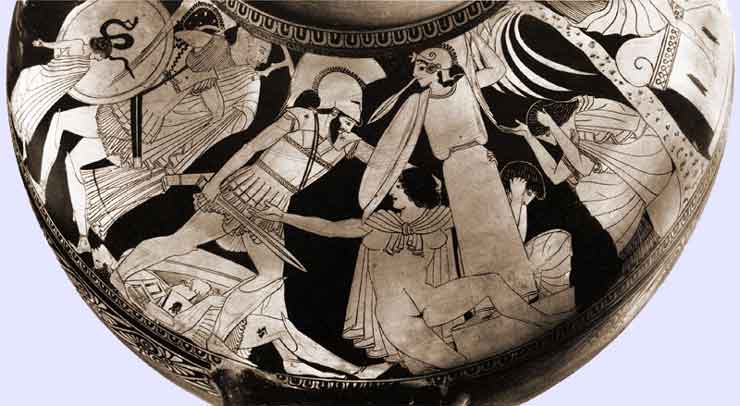 |
| Ajax the Lesser grabbing Cassandra from the altar of Pallas Athena. Detail from a Greek vase. (Photo courtesy of MLahanas.De) |
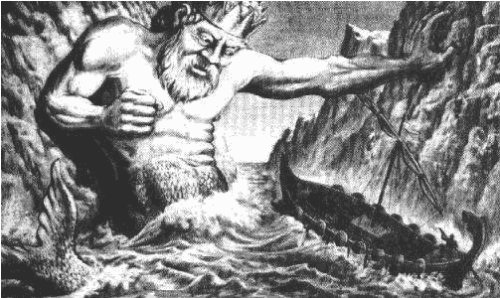 |
| Poseidon sends a storm on the Greek fleet. (Art courtesy of SSQQ.Com) |
Odysseus did not die, but it would take him
ten years to return to his homeland of Ithaca. He left behind his wife,
Penelope, and their little son, Telemachus. At this time, people presumed that
Odysseus was dead and men started to court Penelope. However these were rude, greedy
men: everyday they would spend their time in Odysseus’ house slaughtering and
eating his swine and cattle, drinking his wine, ordering his servants around,
and making a mess of the house.
 |
| Penelope and the Suitors, painting by J.W. Waterhouse. |
Penelope tried to tire them out. She said
that she would choose one of them after she finishes weaving a burial shroud
for Laertes, father of Odysseus. But every night she would undo her work. But one of her handmaids
told the suitors and they discovered her deception. They became more
disagreeable than ever.
Odysseus and his men were driven by the storm for ten days to the land of the Lotus-eaters. The Lotus-eaters ate a kind of flower-food and gave some to the men. Those who tasted the lotus lost all their desire to go home; they wanted to remain in the land of the Lotus-eaters forever. Odysseus dragged his men to their ship, chained them, and sailed away.
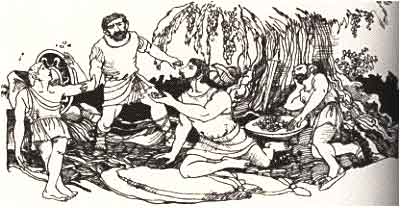 |
| The Lotus-eaters. (Graphic courtesy of MLahanas.De.) |
Next they arrived in the land of the
Cyclops, Polyphemus, son of Poseidon. Odysseus took twelve of his men to investigate
a cave with a fence which they saw. They discovered plenty of sheep and goats, racks
of cheese and pails of milk. Odysseus and his men ate and drank to their full.
That night, Polyphemus came and closed the mouth of the cave with a rock. When
he discovered that there were men there, he killed two of them and ate them;
then he proceeded to sleep.
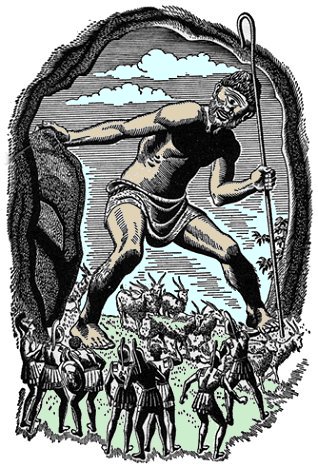 |
| The Cyclops Polyphemus. (Art courtesy of MythManiacs.Com) |
Odysseus had to think of a way to escape.
He cannot kill Polyphemus because only he can roll away the stone door. But
they cannot stay for long: for breakfast he ate another two of his men.
Polyphemus opened the mouth of the cave and let his flocks out. He then left the
men trapped inside his cave. Odysseus and his men took a log, sharpened it, and
hid it. When Polyphemus return, he ate two more of his men. Odysseus then
offered Polyphemus some of the wine he brought with him. The Cyclops fell
asleep, drunk. Odysseus and his men heated the tip of the sharpened log in a
fire and pierced Polyphemus in his eye. Polyphemus tried to find them; but he
could not, because is now blind.
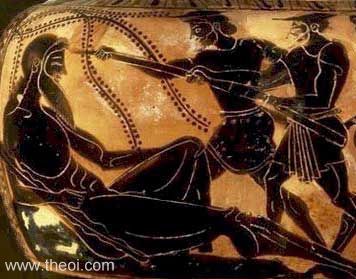 |
| Odysseus and his men piercing the eye of Polyphemus. Detail from a Greek vase. (Photo courtesy of Theoi.Com.) |
Polyphemus opened the mouth of the cave and
tried to catch any of the men who would escape. But Odysseus tied each of his
men under three rams. Polyphemus would feel each of the sheep on the back but
did not check underneath. They were able to escape on their ship. As they were
escaping, Odysseus told the Cyclops who he was: Odysseus, the wrecker of cites,
was the one who put out his eye.
From the island of the Cyclops, they came
to the country of King Aeolus, the viceroy of the winds. Aeolus gave Odysseus a
leather sack which all of the Storm Winds so that no they can travel home
safely. But of his men became curious of the sack, thinking it was treasure.
This released all of the Winds and they were blown for many days to Telepylos, capital of the land of
the Laestrygons.
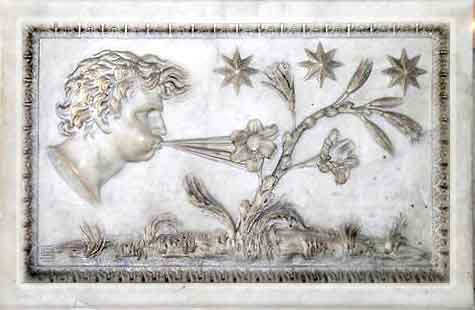 |
| King Aeolus, Keeper of the Winds. (Picture courtesy of MLahanas.De.) |
They escaped to the Aenea, the realm of
Circe, a very beautiful and dangerous witch. She turned the men who were sent
to spy the land into swine. One of the men was able to evade her and reported
back to Odysseus. Odysseus rushed to help his men but Hermes, the messenger god,
met him. The god gave Odysseus an herb (called moly) that would make him immune from Circe’s
powers. Hermes advised him to threaten Circe with his sword so that she will
turn the pigs back into men. But Circe fell in love with Odysseus and gladly restored
his men. She treated them well and they stayed at her house for a year.
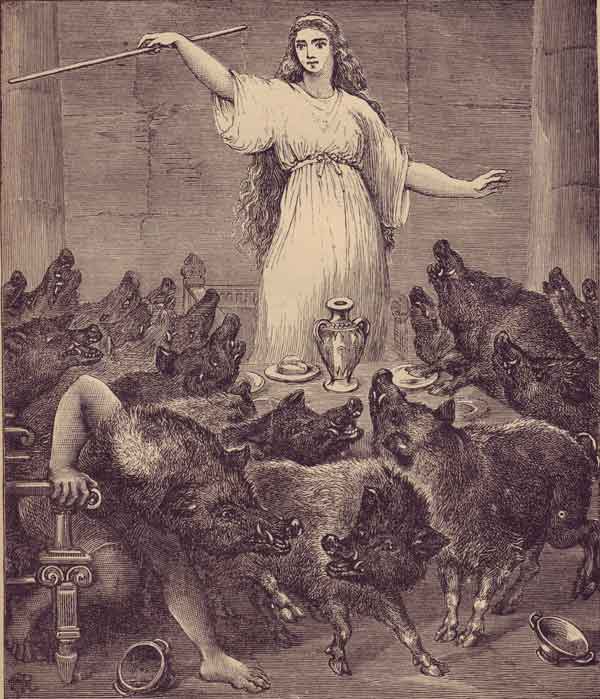 |
| The unhappy Greeks turned into swine by Circe. (Art courtesy of MLahanas.De) |
| Odysseus (seated) consulting with Teiresias (standing) in the Underworld. (Picture courtesy of MLahanas.Com) |
Odysseus and his men sailed away and as per
advice of Circe sailed to the land of the Sirens. The Sirens have a song which seduces
men away from their ships and into their deaths. Odysseus ordered his men to
stop their ears with wax so that they would not hear the Sirens. But Odysseus
wanted to hear the song of the Sirens, so he ordered his men to tie him to the
mast of their ship.
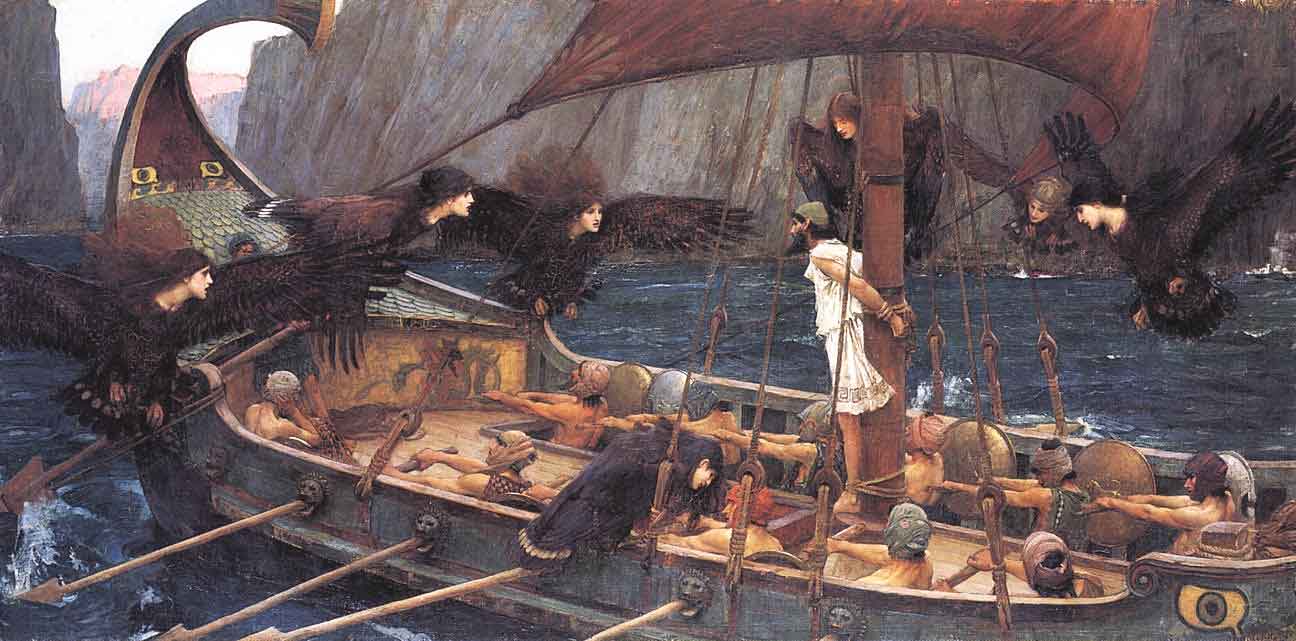 |
| Ulysses (Odysseus) and the Sirens, painting by J. W. Waterhounse. (Picture courtesy of MLahanas.Com) (Contrary to popular notion, Sirens are birds, NOT mermaids.) |
One more danger awaits them: the passage
between Scylla and Charybdis. Scylla is a sheer rock wall (or, the rock where the sea monster Scylla dwelt) while Charybdis is a
whirlpool. (Jason and the Argonauts in their quest for the Golden Fleece were
able to pass through years before.) With the guidance of Athena, Odysseus was
able to make it through but six of his men were killed.
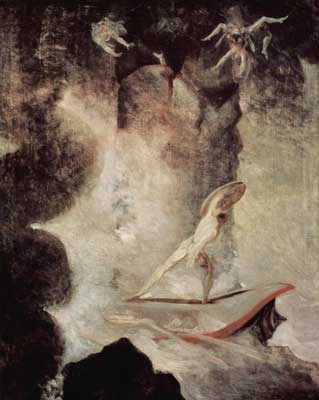 |
| Odysseus between Scylla and Charybdis, painting by J.H. Fussili. (Image courtesy of HellenicaWorld.Com) |
They arrived at the Island of the Helios.
While Odysseus was away praying, his men slaughtered some of the oxen of the
Sun, then roasted and ate them—something that Teiresias warned them not to do. The
Sun shot a thunderbolt that shattered their ship. Everyone was killed. Odysseus
clung on to the keel of their ship. He drifted for ten days until he arrived at the
island of Calypso.
 |
| On the island of Thrinicia, where the cattle of Helios live. (Image courtesy of OdysseusThemesAndCharacters.Edublogs.Org) |
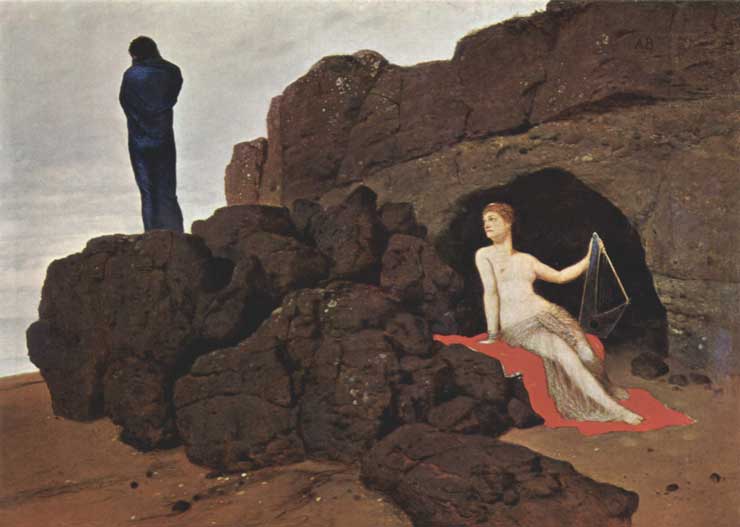 |
| Odysseus and Calypso. Painting by Arnold Bocklin. (Image courtesy of HellenicaWorld.Com) |
Finally, Athena’s anger on Odysseus had
abated and she felt sorry for him. While Poseidon was busy visiting the
Ethiopians down south, across the river Ocean, Athena persuaded the gods to end
the sufferings of Odysseus. The gods were moved by Athena’s plea. Zeus sent
Hermes to Calypso to tell her to let Odysseus go.
Meanwhile, Athena went to Ithaca to help
Odysseus’ son Telemachus, now a grown man, to look for his father. She
disguised herself as a seafaring man and Telemachus received her well. Athena
told Telemachus that he must go on a quest to find his father so that he will
have respect in the eyes of his mother’s suitors. He must go find Nestor, the oldest
and wisest of the Greek chieftains who went on the Trojan War, and to King
Menelaus of Sparta to get clues on his father’s whereabouts. When Telemachus
told this to the suitors, they just laughed at him and refused to lend him a
ship. Telemachus prayed to Athena and she appeared to him as Mentor, Odysseus’
trusted adviser. Athena, as Mentor, promised him a fast ship. They sailed for
Nestor’s home in Pylos.
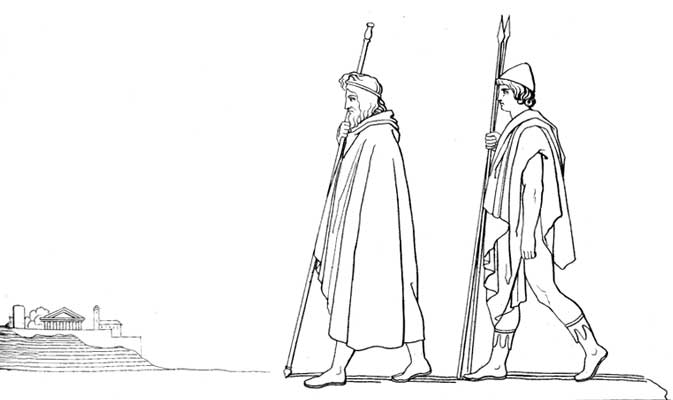 |
| Athena, disguised as Mentor (left) with Telemachus (right). (Image courtesy of MLahanas.De) |
Nestor received them well but said he does
not know where Odysseus went. He advised them to go to Menelaus, who traveled
all the way to Egypt back to Sparta. He also advised Telemachus to take a
chariot instead because it was faster to travel that way than by ship. Telemachus
was accompanied to Sparta by one of Nestor’s sons, Peisistratus.
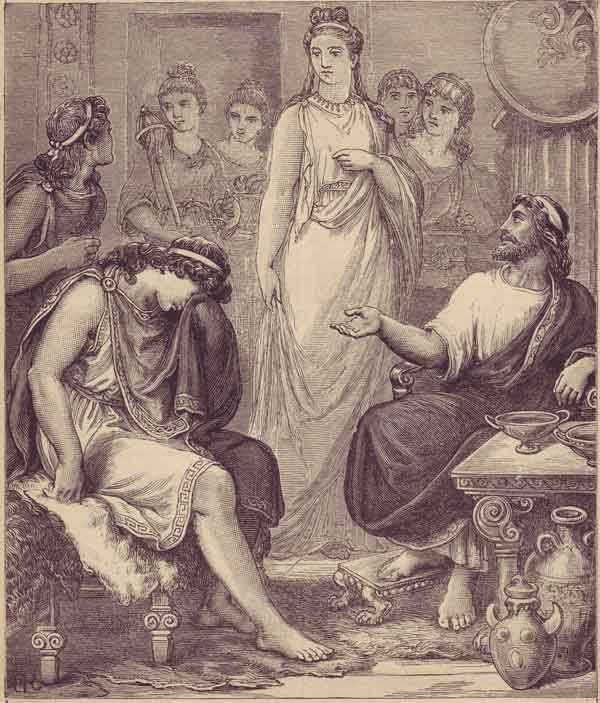 |
| Telemachus (left) in the palace of King Menelaus (right) and Queen Helen (center). (Image courtesy of MLahanas.De) |
In Sparta, Telemachus and Peisistratos were received gladly by
King Menelaus. They also met Helen, the cause of the Trojan War. Menelaus said
that while he was stranded on the island of Pharos in Egypt, he prayed and a
sea-goddess told that her father Proteus would tell him how to get home. But
first, Menelaus must first capture Proteus in for him to talk. The next day
when Proteus went ashore with some seals to bask in the son, Menelaus and his
men ambushed him and pinned him down. He changed shaped into a lion, then a
dragon, and many other animals, even a high-branched tree. Menelaus learned from Proteus that Odysseus
was being kept on an island by Calypso.
Meanwhile, Hermes came to Calypso and told
her the message of Zeus. She had no choice and reluctantly obeyed the king of
the gods. She gave Odysseus twenty great trees to make a raft and loaded it
with all the food and drink needed for the journey. Odysseus sailed for
seventeen days until he met Poseidon, who was returning from his visit with the
Ethiopians. He unleashed a terrible storm which destroyed his raft. He was
rescued by a goddess named Ino, who appeared to him as a seagull and gave him
her veil for protection. Poseidon went away to cause a storm somewhere else;
then Athena came to calm the waves.
Odysseus swam for two days until he was
washed ashore, naked and hungry. He was in the land of the Phaeacians, a kind,
seafaring people. He was discovered by Nausicaä, daughter of King Alcinoüs,
while she was out with her maidens to wash the laundry. She brought her back to
the city and the king received him kindly. The next day Odysseus told King
Alcinoüs and his court his ten-year journey from Troy, beginning with the Lotus-eaters
to his exile on the island of Calypso.
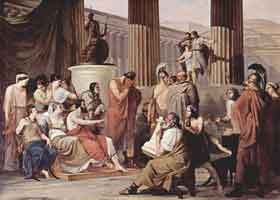 |
| Odysseus in the court of King Alcinous of Phaeacia, telling the story of his odyssey. (Painting by Francesco Hayez; image courtesy of HellenicaWorld.Com) |
The Phaeacians decided to help Odysseus go
home. They gave him a ship and loaded it with treasure. Odysseus went to sleep
but when he woke up he was lying on a beach with all the gifts around him. The
Phaeacian sailors have left. Athena appeared to him as a shepherd and told him
that he is now in Ithaca. When Odysseus finally realized it was Athena, they
hatched a plan to eliminate his wife’s suitors. Athena told him to go to his
trusty old swineherd, Eumaeus, as she went to fetch Telemachus. Odysseus
disguised himself and went to Eumaeus, who treated him well.
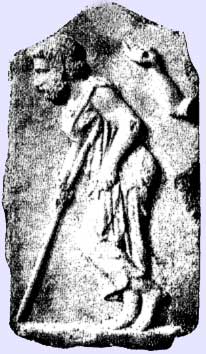 |
| Odysseus as a beggar in Ithaca. (Image courtesy of HellenicaWorld.Com) |
Athena went to Telemachus in Sparta and
told him to sail home. He bade Menelaus and Helen farewell. The goddess told
him not to go into the city but to go to Eumaeus first. At Eumaeus’ home, the
swineherd treated him well. Telemachus dispatched him to inform his mother of
his return. When Odysseus and Telemachus were alone, Odysseus finally revealed
himself as his father. They prepared a plan against the suitors of Penelope.
The next morning, Telemachus and his
father, disguised as a beggar, returned to the palace. As they entered into the
palace, they passed by an old dog. It was Argo, which wagged his tail but could
not pull himself toward him. Odysseus pretended not to recognize the dog and as
he turned away, the old dog died.
Telemachus went around the palace and hid
all the weapons. Meanwhile, the suitors mocked and abused Odysseus, thinking
that he was just an old beggar. Penelope rescued him and told Eurycleia,
Odysseus’ old nurse, to take care of him. As she was washing his feet,
Eurycleia recognized the scar on Odysseus’ foot, caused by a wild boar hunt. He
warned her not to say a word to anyone.
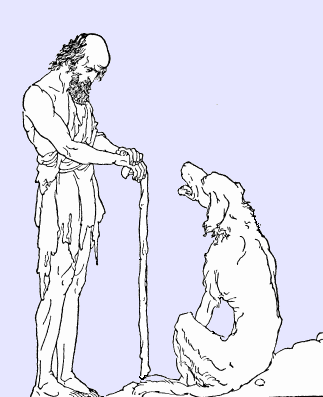 |
| Odysseus and Argo the old dog. (Image courtesy of MLahanas.De) |
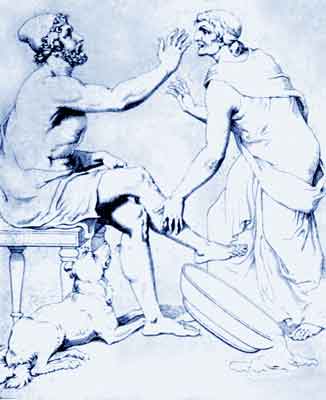 |
| Odysseus recognized by Eurycleia, by Christian Gottlob Heyne. (Image courtesy of MLahanas.De) |
The next morning, Penelope gave her suitors
a test. She brought out Odysseus’ bow and arrow and twelve axes. Whoever can
string the bow and shoot an arrow through the twelve axes will be her husband.
But no one can bend Odysseus’ bow, no manner how strong they were.
Odysseus, still disguised as a beggar,
asked to join the contest. He effortlessly stringed his bow and shot an arrow
through the twelve axes, killing one of the suitors. He finally revealed
himself and attacked the suitors. They could not find their weapons because
Telemachus hid them. As he shot the suitors one by one, Telemachus kept them
from escaping by using a spear.
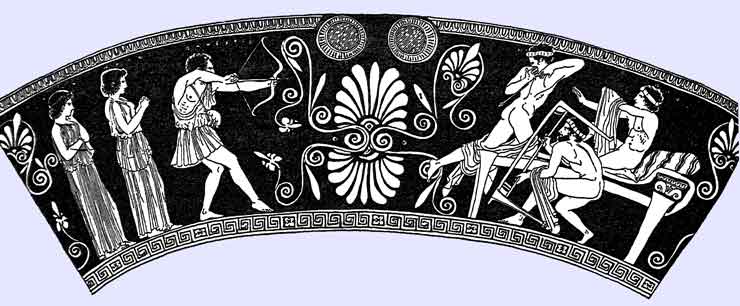 |
| Odysseus slaughtering the suitors of Penelope; detail from a Greek vase. (Image courtesy of HellenicaWorld.Com) |
After the massacre of the suitors,
Eurycleia and her maids restored everything to order. When the old nurse told
Penelope that Odysseus had returned, she could not believe it. Finally Odysseus
and Penelope had a joyful reunion. They held a great feast in the hall of the
palace with plenty of singing and dancing, because after twenty years of
wandering hardship, Odysseus was home at last.
* * *
The third part of the trilogy, which tells of the
similar journeys of the Trojan hero Aeneas, is told in The Aeneid, by Virgil.

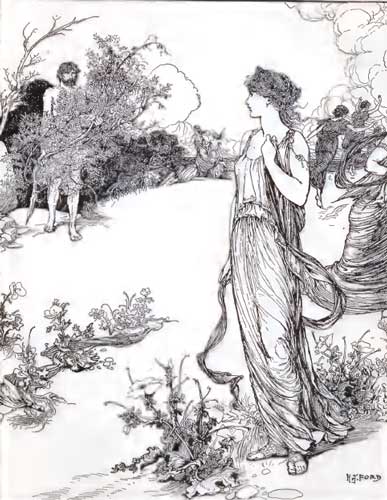
No comments:
Post a Comment